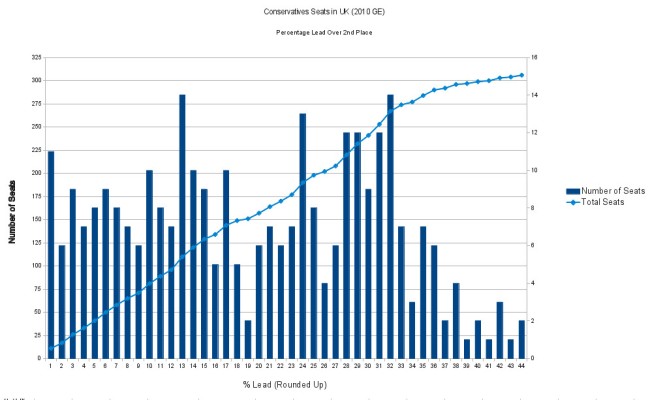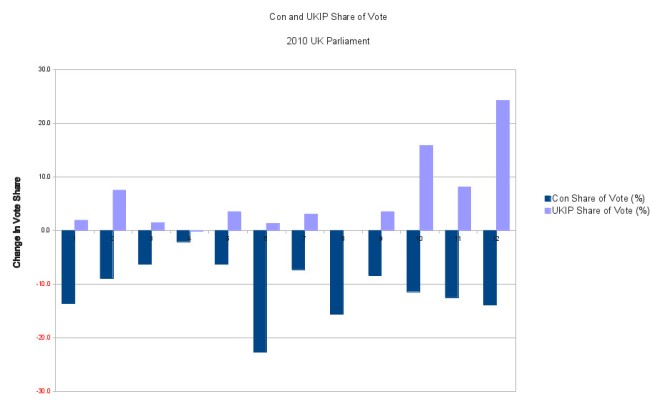The Eastleigh by-election can described as a hard fought win for the Liberal Democrats or a sign that Ed Miliband’s one nation message has travelled no further south than the Watford gap.
However, the second place by UKIP, dumping the Tories into third, has brought home to the Conservatives the fact that UKIP are a dangerous threat to them winning the next general election. This is the big message from Hampshire.
| Eastleigh by-election, 2013 | |||||
|---|---|---|---|---|---|
| Party | Candidate | Votes | % | ±% | |
| Liberal Democrat | Mike Thornton | 13,342 | 32.06% | -14.44% | |
| UKIP | Diane James | 11,571 | 27.80% | +24.20% | |
| Conservative | Maria Hutchings | 10,559 | 25.37% | -13.93% | |
| Labour | John O’Farrell | 4,088 | 9.82% | +0.22% | |
| Independent | Danny Stupple | 768 | 1.85% | N/A | |
| National Health Action | Iain Maclennan | 392 | 0.94% | N/A | |
| Beer, Baccy and Crumpet Party | Ray Hall | 235 | 0.56% | N/A | |
| Christian | Kevin Milburn | 163 | 0.39% | N/A | |
| Monster Raving Loony | Howling Laud Hope | 136 | 0.33% | N/A | |
| Peace | Jim Duggan | 128 | 0.31% | N/A | |
| Elvis Loves Pets | David Bishop | 72 | 0.17% | N/A | |
| English Democrats | Michael Walters | 70 | 0.17% | -0.33% | |
| TUSC | Daz Procter | 62 | 0.15% | N/A | |
| Wessex Regionalist | Colin Bex | 30 | 0.07% | N/A | |
| Majority | 1,771 | 4.26% | -2.9% | ||
| Turnout | 41,616 | 52.8% | -16.5% | ||
| Liberal Democrat hold | Swing | -19.2 | |||
The effect of UKIP has been to divide the right. Mirroring the impact the SDP had on Labour in the eighties, UKIP is taking crucial votes from the Conservatives.
Below is a graph showing the percentage lead in each seat the Conservatives won in the 2010 election over the second place party.
As can be seen, if just 10% of the Conservative vote goes elsewhere and the second placed party just stands still, the loss of seats would be around 80. Is this possible or likely?
Below is a chart showing the change in vote share for the Conservatives and UKIP in the by-elections they have fought this Parliament.
Of course, by-elections can exaggerate the sort of changes seen in a general election. However, the Conservatives are not only under threat from UKIP. In the north and urban areas Labour is moving strongly against them, without the sort of splits that divided them in the eighties. Eastleigh demonstrated that Liberal Democrat heartlands have a tough core.
There is irony in that two euro-sceptic parties have split the vote, allowing a pro-European party to win the seat. One might think that an electoral pact would help to ensure a bigger voice for euro-sceptics. This is unlikely for several reasons in my view.
Firstly, Nigel Farage, UKIP Leader, now has almost a cult following. He is driven and motivated, and the smell of fear from Conservative HQ will be too strong to resist.
Secondly, the Euro elections loom next year. Given the proportionate system used to elect MEPs and subject being UKIP’s key issue, they are very likely to kick the Conservatives hard. With less than 12 months before the general election campaign, a bruised set of Tory backbenchers will be very nervous about their future. They will be in no mood to talk deals with the very party who threaten them.
Despite claims that the Eastleigh by-election was just another mid-term protest vote, I think the roots of the defeat of the Conservatives in 2015 are growing strongly.


